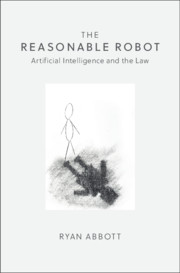Book contents
- The Reasonable Robot
- The Reasonable Robot
- Copyright page
- Dedication
- Contents
- Introduction: Artificial Intelligence and the Law
- 1 Understanding Artificial Intelligence
- 2 Should Artificial Intelligence Pay Taxes?
- 3 Reasonable Robots
- 4 Artificial Inventors
- 5 Everything Is Obvious
- 6 Punishing Artificial Intelligence
- 7 Alternative Perspectives on AI Legal Neutrality
- Third-Party Materials
- Notes
- Index
3 - Reasonable Robots
Published online by Cambridge University Press: 15 June 2020
- The Reasonable Robot
- The Reasonable Robot
- Copyright page
- Dedication
- Contents
- Introduction: Artificial Intelligence and the Law
- 1 Understanding Artificial Intelligence
- 2 Should Artificial Intelligence Pay Taxes?
- 3 Reasonable Robots
- 4 Artificial Inventors
- 5 Everything Is Obvious
- 6 Punishing Artificial Intelligence
- 7 Alternative Perspectives on AI Legal Neutrality
- Third-Party Materials
- Notes
- Index
Summary
AI has the potential to be substantially safer than people. Self-driving cars will cause accidents, but they will cause fewer accidents than people. Because automation will result in substantial safety benefits, tort law should encourage its adoption as a means of accident prevention. Under current laws, suppliers of AI tortfeasors are strictly responsible for their harms. A better system would hold them liable for harms caused by AI tortfeasors in negligence. Not only would this encourage the use of AI after it exceeds human performance, but also the liability test would focus on activity rather than design, which would be simpler to administer. More importantly, just as AI activity should be discouraged when it is less safe than a person, human activity should be discouraged when it is less safe than an AI. Once AI is safer than a person and automation is practicable, human tortfeasors should be held to the standard of AI behavior.
Keywords
- Type
- Chapter
- Information
- The Reasonable RobotArtificial Intelligence and the Law, pp. 50 - 70Publisher: Cambridge University PressPrint publication year: 2020
- 1
- Cited by

